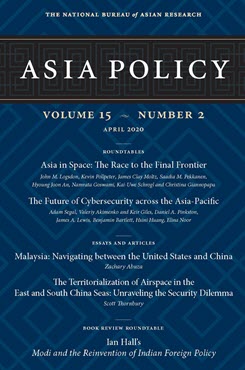Essay from Asia Policy 15.2
Malaysia: Navigating between the United States and China
This essay examines relations between Malaysia and China since the 2018 election and finds that Malaysia has deepened economic relations with China but that tensions over trade and investment, maritime relations, and the treatment of Muslims still complicate the bilateral relationship.
EXECUTIVE SUMMARY
MAIN ARGUMENT
Malaysia has demonstrated a cautious hedging strategy that overall tends to acquiesce toward China, even in areas of tension. Despite initial fanfare that Mahathir Mohammad was going to defy China and cancel several marquee Belt and Road Initiative (BRI) projects, Malaysia deepened its economic relations with China after the 2018 election. His Pakatan Harapan coalition government skillfully renegotiated BRI projects, embraced Huawei and its 5G network, and sought additional trade and investment. In the maritime domain, Malaysia has adopted a less publicly confrontational position toward China, while China has been less aggressive but continues to maintain a regular presence in Malaysia’s exclusive economic zone. Though Malaysia has been outspoken regarding the plight of Muslim populations facing oppression elsewhere around the globe, the country has demurred on China’s treatment of its own Muslim Uighur population. At the same time, however, Malaysia has selectively challenged China on certain principles, such as pursuing legal claims on its continental shelf, and maintained traditional U.S. ties. Malaysia serves as a bellwether state for understanding Chinese foreign diplomacy through BRI and thus on the whole provides evidence of China’s ability to recalibrate and address local concerns and pushback.
POLICY IMPLICATIONS
- The new pro-Malay coalition government Perikatan Nasional, which replaced the Pakatan Harapan government in February–March 2020, is unlikely to change Malaysia’s China policy. Indeed, the rapid spread of the Covid-19 virus in Malaysia will increase its dependence on China, which has quickly stepped in to provide medical assistance and economic aid.
- Although ties with the U.S. remain strong, U.S. policy is perceived as being overly militarized and based primarily on conducting freedom of navigation operations in the South China Sea. Despite U.S. pressure, Malaysia is largely embracing China’s institutions and regional development architecture.
- Malaysia will continue to adopt a nuanced hedging strategy toward China, embracing investment, trade, and technology from China while pushing back on certain principles.
Zachary Abuza is a Professor at the National War College in Washington, D.C. (United States).
Note: The views are the author’s alone and do not reflect the opinions of the National War College or the U.S. Department of Defense.
About Asia Policy
Asia Policy is a peer-reviewed scholarly journal presenting policy-relevant academic research on the Asia-Pacific that draws clear and concise conclusions useful to today’s policymakers. Asia Policy is published quarterly in January, April, July, and October and accepts submissions on a rolling basis. Learn more


